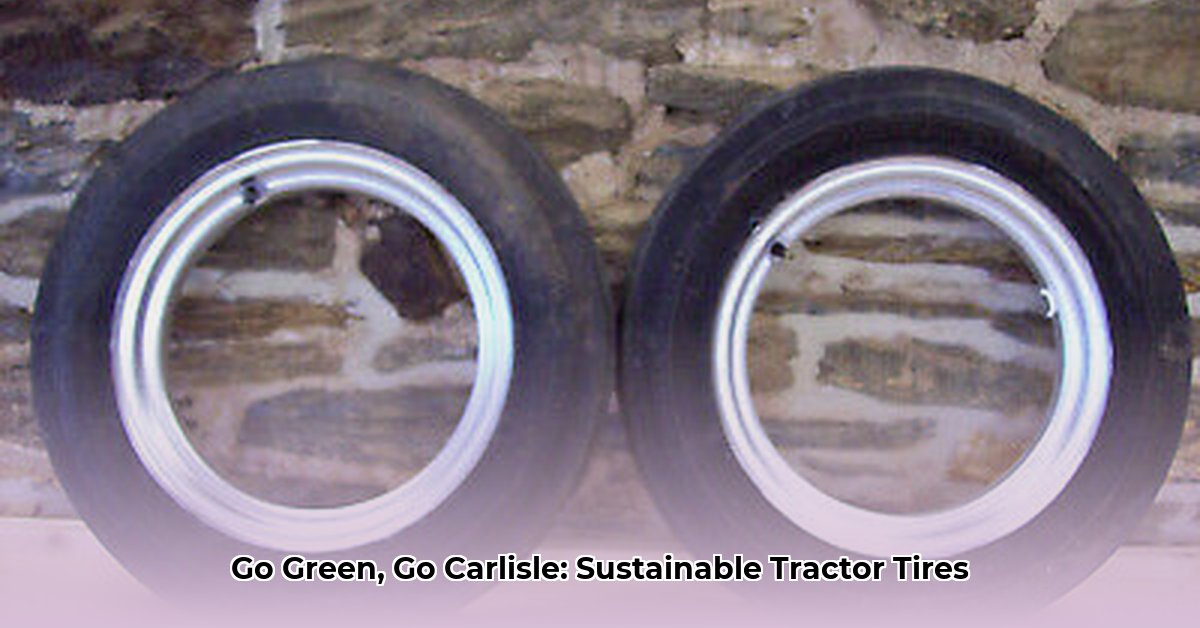
4.00-15 Tractor Tire: A Sustainability Analysis
Choosing sustainable agricultural practices requires careful consideration of all components, including seemingly minor aspects like tractor tires. This article analyzes the environmental impact of the 4.00-15 tractor tire, focusing on Carlisle's offerings and the broader market. We examine the available data and highlight the critical need for greater transparency and independent testing to inform sustainable purchasing decisions. For more on tire options, see this helpful resource on 3-rib tractor tires.
Carlisle's 4.00-15 Tractor Tire: Specifications and Applications
Carlisle manufactures a 4.00-15 tractor tire designed for use on smaller tractors in various agricultural applications. While specific technical specifications (e.g., tread depth, load capacity) are readily available from Carlisle's website, comprehensive data on its environmental impact is currently limited. This lack of information hinders a complete sustainability assessment.
Sustainability Assessment: Addressing the Data Gap
A comprehensive life cycle assessment (LCA) is crucial for evaluating the sustainability of any product, including tractor tires. An ideal LCA for a 4.00-15 tire would encompass:
- Material Sourcing: The origin and environmental impact of raw materials (rubber, steel, etc.). What percentage of recycled materials are incorporated? Are these sources sustainably managed?
- Manufacturing: The energy consumption during the manufacturing process and associated greenhouse gas emissions. What pollution control measures are in place?
- Tire Lifespan and Performance: The expected service life of the tire, its fuel efficiency (lower rolling resistance reduces fuel consumption), and traction performance under various soil conditions. How does this compare to competitor tires? Do they meet standards like those set by the USDA?
- End-of-Life Management: The recyclability or disposal options for the tire at the end of its life. What is the potential for responsible recycling and the reduction of landfill waste?
Unfortunately, much of this critical data is unavailable for Carlisle's 4.00-15 tire and many competitors. This lack of transparency makes it difficult to objectively assess its sustainability compared to alternative options. How can farmers make informed decisions without access to complete LCA data from all manufacturers?
Comparative Analysis: The Need for Independent Testing
Currently, a direct comparison with competing 4.00-15 tractor tires focusing on sustainability is hampered by the absence of standardized, independent testing. A hypothetical comparison table highlights this data deficit:
| Feature | Carlisle 4.00-15 | Competitor A | Competitor B |
|---|---|---|---|
| Estimated Tread Life (Hours) | Data Unavailable | 1000 | 1200 |
| Fuel Efficiency Improvement (%) | Data Unavailable | +5% | +8% |
| Traction (Clay Soil) | Data Unavailable | Good | Excellent |
| Recyclability | Data Unavailable | Partially Recyclable | Fully Recyclable |
This illustrates the critical need for independent evaluation to provide objective comparisons and guide farmers towards more sustainable tire choices. What independent organizations are currently conducting such research?
Recommendations for Sustainable Agriculture
- Demand Data Transparency: Farmers and agricultural organizations should actively demand more comprehensive sustainability data from tire manufacturers, including complete LCAs. Without this, informed purchasing decisions are impossible.
- Lifecycle Costing: Farmers should consider the total cost of ownership, encompassing initial purchase, replacement costs, fuel efficiency impacts, and end-of-life disposal or recycling expenses. A higher upfront cost may be offset by longer service life and reduced operational expenditures.
- Prioritize Available Information: While comprehensive data remains elusive, focus on brands offering the most detailed performance and sustainability information available. Even small improvements in fuel efficiency or tire longevity can have a noticeable positive environmental impact over time.
- Support Independent Testing: Encourage and support initiatives promoting independent testing and comparative analysis of tractor tires, focusing on sustainability metrics.
Conclusion: Towards a More Sustainable Future
Selecting sustainable 4.00-15 tractor tires requires improved data transparency from manufacturers and a collective effort from stakeholders across the agricultural sector. Robust, independent testing is crucial for providing objective comparisons and facilitating informed purchasing decisions. The long-term sustainability of agricultural practices depends on a commitment to data-driven choices in all aspects of farming, including seemingly minor components like tractor tires. Only through greater transparency and collaboration can we effectively move towards a more environmentally responsible agricultural future.